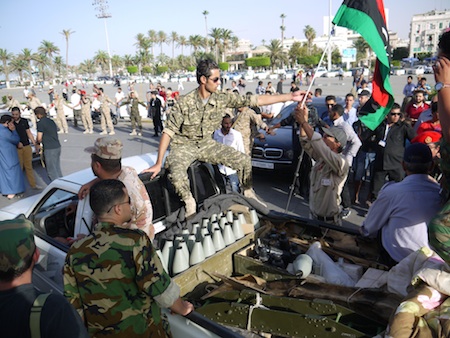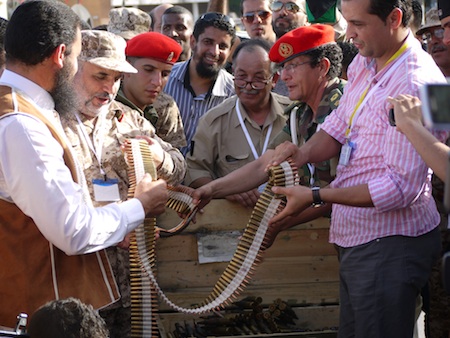By George Grant.

Tripoli, 29 September:
Militiamen and private citizens turned out in their hundreds if not thousands on Tripoli’s Martyr’s Square today . . .[restrict]to hand over weapons acquired during and after last year’s revolution that drove the Qaddafi regime from power.
Small arms, anti-aircraft guns and RPGs were delivered by the truckload to the sounds of a military marching band, pop music and a running commentary via megaphone of who had delivered what.
For a moment, each man was made to feel like a star as his name and the weapons he had surrendered were announced with the sort of enthusiasm usually reserved to declare an arriving president. Cheers of “God is Great” went up as the next man stepped forward and the process was repeated again.
Two tanks were also brought along to be delivered to the waiting National Army. The first tank belonged to the Triq Asour brigade, located near to Qaddafi’s former compound of Bab Al-Azizya and said to have been hitherto independent of either the Army or the Ministry of Interior. It is not known who brought the second.
“We came today because Libya is free and we no longer need these weapons”, said Ahmed Abdullah Brishny, a member of the Zawiya brigade who had just handed in two 14.5mm and 12.5mm machine guns, a Kalashnikov and several cases of ammunition.
Bearded and berobed, Brishny declared that he had full confidence in the Army and wanted to remind people that Islam is a religion of peace.
“Islam is for peace, not for killing”, he said. “We felt collectively responsible for the disaster that befell the American ambassador in Benghazi. We have to stop these radical religious people”.
Brishny explained that his brigade had been galvanised to merge with the Army following the events in Benghazi and that the vast majority of weapons in Zawiya had already been handed over.

“The Libyan people have decided to move from fighting a revolution to building a country”, said Brigadier Hussein Abdullah, one of the officers overseeing the weapons collection.
“We are working day and night to build a new Libyan Army and to protect the people”.
Given the Army’s comparative weakness, those in attendance at today’s event had remarkable confidence in its capacity to keep them safe.
The two decorated Hyundai hatchbacks, flat-screen televisions and iPads which are to be given away in a prize draw at the conclusion of the hand-in tomorrow evening do not appear to have offered a comparable incentive.
“As ordinary people, we want to support our Army, and that means trusting them to protect us”, said Abdul Ben Ashour, an engineer waiting to hand over his Kalashnikov. “I trust the Army because it belongs to the Government of the new Libya”.
The Tripoli weapons handover is being accompanied by a parallel event taking place in Benghazi, and the Government has declared its intention to roll out the programme across the country.
The initiative had been due to begin on 16 September, but was postponed when the Government declared that a new annual Martyr’s Day celebration was to be held then instead.
Thousands of small arms and heavier type weapons are still believed to be in the hands of militia and private citizens across Libya, and it remains to be seen how successful the programme will be elsewhere.
Yesterday evening saw Islamist demonstrators in Benghazi set two cars ablaze and lob hand grenades at an Interior Ministry building in protest at the disbanding of the Ansar Al-Sharia brigade, believed to have been involved in the fatal attack on the US Consulate on 11 September.
The Government has said that all militias in Libya must now submit to the authority of the Army or be disbanded.
Questions remain, however, as to whether these brigades will be broken up with members joining the security services as individuals, which many in Congress and on the street have called for, or else merge as complete units.
There is also considerable uncertainty as to how quickly the Government will be able to impose its will on parts of the country where the state’s authority remains comparatively weak, such as Zintan, large swathes of the south and the former Qaddafi stronghold of Bani Walid.
Correction — The commander of the Triq Asour brigade contacted the Libya Herald to inform us that he only had one tank, which had been handed in. The authorities at the weapons collection had informed this paper the brigade was responsible for both tanks. We apologise for this error. [/restrict]







